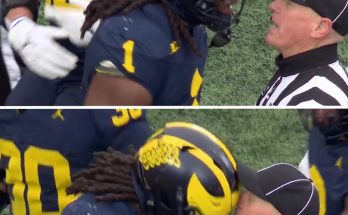There’s an unspoken rule in college football — a code that runs deeper than playbooks, deeper than game-day rituals, deeper even than the roar of 100,000 fans on a crisp Saturday afternoon. It’s not written in any handbook, yet every player, coach, and fan knows it: you NEVER throw up the “Horns Down” when you’re standing next to a Texas Longhorn.
That simple gesture — two fingers pointed downward in mockery of the University of Texas’ iconic “Hook ’Em Horns” — has become one of the most recognizable taunts in sports. It’s brash, rebellious, and laced with history. To Longhorns fans, it’s a direct shot at pride, tradition, and everything the burnt orange stands for. To their rivals, it’s the ultimate symbol of defiance. But in the world of college football, respect still matters — and when you’re face-to-face with a Texas player, you learn real quick that some symbols carry more weight than words ever could.
College football thrives on passion, on rivalries that transcend generations. Oklahoma vs. Texas. Texas A&M vs. Texas. Baylor, TCU, Texas Tech — everyone wants their shot at the Longhorns. They are, after all, the giants of the Lone Star State. The prestige, the history, the swagger — it’s all part of the Texas identity. When you wear that burnt orange jersey, you’re representing more than a football team. You’re embodying a legacy that dates back over a century — the pride of a university that has produced legends, champions, and icons.
That’s why the “Horns Down” is never just a hand sign. It’s a statement — one that carries emotion, intent, and often a touch of disrespect. On the field, it’s used to rile up the crowd or to send a message after a big play. Off the field, though, when the cameras aren’t rolling and the adrenaline fades, that same gesture can feel like crossing a line.
Imagine standing next to a Texas Longhorn player — a young man who’s dedicated years of his life to wearing that logo with pride. He’s gone through grueling practices, early mornings, long film sessions, and the relentless expectations that come with the program. Then someone casually throws up a “Horns Down” right beside him. It’s not just a joke anymore; it’s personal.
In the world of college sports, symbols matter because they represent belonging. Every team has its rallying cry, its chant, its gesture that says, “This is who we are.” For Texas, “Hook ’Em Horns” isn’t just a phrase — it’s a way of life. It’s flashed by alumni at weddings, by fans at tailgates, and by players when they make a game-winning play. It’s pride embodied in two simple fingers.
So when you flip that symbol upside down, it’s no longer about rivalry — it’s about identity. And when you disrespect a symbol of identity, you’re not just taunting a team; you’re challenging a culture.
There’s something almost poetic about how much power a small gesture can have. College football thrives on this kind of drama — the emotion, the energy, the edge. The “Horns Down” has become as much a part of the Red River Rivalry as the game itself. Every October in Dallas, when Oklahoma and Texas meet on that neutral field, emotions run high. Fans from both sides flood the Cotton Bowl, split right down the middle — crimson on one side, burnt orange on the other. And when an Oklahoma receiver scores and throws the “Horns Down,” the crowd erupts.
But when that same gesture happens off the field, in the presence of a Longhorn, it’s a different story. There’s an understanding that even rivals deserve respect. Because beneath the trash talk and the taunting, every player knows how much sweat and sacrifice goes into this game. The line between competition and disrespect is thin — and every great athlete learns where it is.
The truth is, rivalries fuel college football, but respect sustains it. Without it, the spirit of the game erodes. Every time a player steps onto the field, he carries not only his own pride but the legacy of everyone who came before him. That’s why the greats — the Vince Youngs, the Ricky Williamses, the Colt McCoys — always carried themselves with a certain grace. They played with fire but never forgot the code.
It’s easy for fans to overlook that. From the stands or the couch, throwing up a “Horns Down” feels harmless — just part of the fun. It’s passion, it’s banter, it’s college football. But on the field, when the sweat is real and the stakes are high, respect still matters. Because the guy wearing that Texas jersey isn’t just an opponent — he’s a competitor chasing the same dream you are.
There’s a story told among players — that when you beat a great program, you don’t need to mock them. You let the scoreboard speak. That’s the true mark of a champion. Great teams don’t waste energy on taunts; they celebrate by executing, by dominating, by walking off the field knowing they earned it. That’s why you’ll rarely see Texas players responding to “Horns Down” gestures. They don’t have to. Their tradition speaks louder than any hand sign ever could.
Still, there’s something undeniably magnetic about that little gesture. It’s rebellious. It’s bold. It’s what makes college football college football. When an underdog team comes into Austin and pulls off the upset, throwing up the “Horns Down” becomes a moment of triumph — a symbolic claim to the spotlight, even if just for a day. And that’s part of what keeps fans coming back — those raw, emotional moments that make sports feel bigger than life.
But even then, the code remains: you don’t do it when you’re right next to a Longhorn. Not because you’re scared — but because you respect what that emblem stands for. It’s not fear; it’s acknowledgment. It’s understanding that while rivalries define competition, mutual respect defines character.
There’s also something to be said about how the gesture has evolved. Over time, “Horns Down” has become more than just a taunt from Oklahoma. It’s used by nearly every Texas opponent now, from SEC newcomers to Big 12 rivals. It’s become universal shorthand for “we’re coming for you.” The NCAA has even weighed in at times, debating whether the gesture constitutes unsportsmanlike conduct. That’s how deep this runs — it’s not just about football anymore. It’s about perception, pride, and power.
The Texas brand carries that kind of weight. Their logo, their chant, their burnt orange — it’s iconic. You can’t talk about college football history without talking about the Longhorns. Their stadium, Darrell K Royal–Texas Memorial, is a cathedral of the sport. Their fans are as loyal as they come. Their influence stretches beyond sports — it’s a cultural identity tied to the very heart of Texas itself.
So yes, people will always throw up the “Horns Down.” It’s inevitable. It’s part of what keeps the game spicy. But standing next to a Texas player, that’s sacred ground. You don’t mock someone’s pride to their face — you respect the journey that got them there. Every player, no matter the school, knows that football is family. You might wear different colors, but the grind is the same.
That’s why the best rivalries — the true, lasting ones — are built on both hatred and respect. Because without respect, the hate means nothing. You need that balance — the push and pull of passion and restraint. When the whistle blows and the helmets come off, what’s left isn’t animosity — it’s admiration.
In many ways, the “Horns Down” debate is a microcosm of what makes sports so human. It’s about pride and rivalry, emotion and etiquette. It’s about where we draw the line between expression and disrespect. And it’s a reminder that no matter how fierce the competition gets, sportsmanship still matters.
So the next time you’re in the presence of a Longhorn — whether it’s on the field, at a tailgate, or in the locker room — remember the unwritten rule. You can cheer, you can talk trash, you can even celebrate your team’s victory however you want. But keep those horns where they belong.
Because when you stand next to a Texas Longhorn, you’re standing next to tradition. You’re standing next to history. You’re standing next to a symbol that means something to millions of people who’ve lived and breathed that burnt orange their entire lives.
Respect that.
Because one day, when it’s your turn to wear the jersey, you’ll want the same in return.
In college football, the gestures may fade, the rivalries may evolve, and the conferences may change. But what never goes out of style is respect. And that’s why the rule stands strong, generation after generation:
You NEVER throw up the “Horns Down” when you’re standing next to a Texas Longhorn.
Because no matter how heated the rivalry, no matter how loud the crowd, there’s still honor in the game — and real players never forget that.



